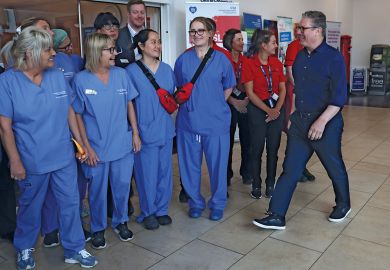Brevity, importance and "delight": these are the criteria, according to Robert Birnbaum in his introduction to Speaking of Higher Education , used to select entries for the first compilation of quotations dealing exclusively with higher education. What Birnbaum, emeritus professor of higher education at the University of Maryland, fails to mention is that inclusion in this collection depends largely on one critical characteristic: you need to be an American. It particularly helps if you are a former president of Harvard University.
It is an invidious task to compile any collection of quotations that aspires to be comprehensive. And, in its introduction, the book tantalises the reader with quotes from some of the world heavyweights of the academic soundbite - Horace, Aristotle, Adam Smith and William Archibald Spooner (he of the spoonerism). These, however, serve only to highlight the limitations of later chapters; this is not a work with a global outlook in any true sense. A tiny proportion (my estimate is about 300) of the 1,670 quotes emanate from outside the US. Apart from anything else, this US-centricity means that, after a while, quotes from US Ivy League presidents become wearing - no matter how "delightful" their words are.
Take chapter three, which covers education policy. Harvard alone has four times the entries of those from the rest of the world put together. (The non-US entries tend also to come from the general canon of literature - Kingsley Amis and Nietzsche - rather than from academia.) Harvard may have the largest university endowment on earth, but can the pronouncements of a few Harvard presidents really justify more space than the entirety of thought on higher education from the rest of civilisation over the past 2,000 years?
This parochialism is a pity because the book does remind us of some of the constants of the debate on higher education: complaints over falling academic standards, concerns over threats to academic freedom and calls for more money. The book could have provided a useful historical record of the enduring issues at the heart of academic endeavour.
Perhaps the quote that sums up the book is one that appears in a section on quality and standards. Inevitably, it comes from a Harvard man, Henry Rosovsky, dean of the faculty of arts and sciences: "Fully two thirds to three quarters of the best universities in the world are located in the United States" (1990). Well, the first world rankings of universities produced by The Times Higher last month had a smaller US showing at the top of the tables. While there can be no doubt that the US is the world's academic superpower, among the first signs of an empire's decline is an unwillingness to acknowledge or appreciate the views of outsiders.
Speaking of Higher Education is only a collection of quotations, but it echoes an alarming trend in the US - from tighter student visa restrictions and fewer research collaborations to shortsighted government policies on climate change. It suggests scant regard for academic views outside the US. If the history of higher education teaches us anything, it is that the pursuit of knowledge flourishes when open to the widest range of voices.
Better to listen to the quoted inaugural address of Lawrence Lowell, a famous president of Harvard, in 1909: "The object of the undergraduate department is not to produce hermits, each imprisoned in the cell of his own intellectual pursuits, but men fitted to take their place in the community, and who live in contact with their fellow men."
Lee Elliot Major is news editor, The Times Higher.
Speaking of Higher Education: The Academic's Book of Quotations
Author - Robert Birnbaum
Publisher - American Council on Education and Praeger
Pages - 283
Price - £22.99
ISBN - 0 5 98071 5
Register to continue
Why register?
- Registration is free and only takes a moment
- Once registered, you can read 3 articles a month
- Sign up for our newsletter
Subscribe
Or subscribe for unlimited access to:
- Unlimited access to news, views, insights & reviews
- Digital editions
- Digital access to THE’s university and college rankings analysis
Already registered or a current subscriber?



